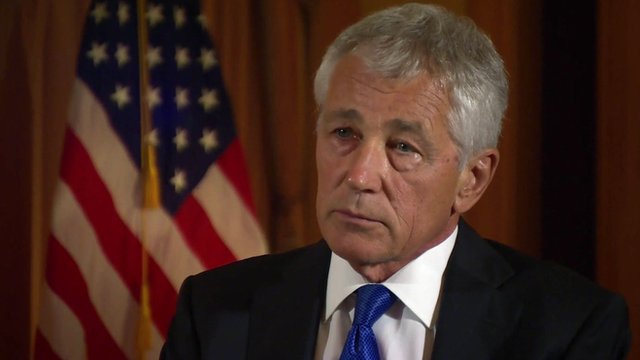Syria intervention: US ready to launch strike
The US forces are “ready” to launch strikes on Syria if President Barack Obama chooses to order an attack, Defense Secretary Chuck Hagel announces.
“We have moved assets in place to be able to fulfill and comply with whatever option the president wishes to take,” said Chuck Hagel.
US Secretary of State John Kerry has said there is “undeniable” proof that Syria had used chemical weapons.
The UK Parliament is to be recalled on Thursday to discuss possible responses.
Britain is considering military responses to the attack.
British PM David Cameron, who has cut short his holiday and returned to London, said MPs would vote on a “clear motion” on the crisis.
Syria’s allies, Russia and China, have stepped up their warnings against military intervention in Syria, with Moscow saying any such action would have “catastrophic consequences” for the region.
Meanwhile Syrian Foreign Minister Walid Muallem said he rejected “utterly and completely” claims that Syrian forces had used chemical weapons.
The Syrian government has blamed rebel fighters for the suspected chemical attack, which took place on August 21 near the Syrian capital Damascus, and reportedly killed more than 300 people.
On Monday, UN chemical weapons inspectors were fired on while investigating one of the five alleged attack sites around Damascus.

Defense Secretary Chuck Hagel announced that the US forces are “ready” to launch strikes on Syria if President Barack Obama chooses to order an attack
Chuck Hagel said the US Department of Defense had provided President Barack Obama with “all options for all contingencies”.
He said that intelligence currently being gathered by the UN inspectors would confirm that the Syrian government was responsible for the chemical attacks last week.
“I think it’s pretty clear that chemical weapons were used against people in Syria,” he said.
“I think the intelligence will conclude that it wasn’t the rebels who used it, and there’ll probably be pretty good intelligence to show is that the Syria government was responsible. But we’ll wait and determine what the facts and the intelligence bear out.”
Chuck Hagel’s remarks come a day after John Kerry accused the Syrian government of destroying evidence of its chemical weapons use in Damascus by shelling the area.
He said his administration had additional information about the attacks that it would make public in the days ahead. John Kerry described the assaults as a “moral obscenity”.
“What we saw in Syria last week should shock the conscience of the world. It defies any code of morality,” John Kerry said at a news conference on Monday.
“Make no mistake, President Obama believes there must be accountability for those who would use the world’s most heinous weapons against the world’s most vulnerable people.”
The UN Security Council is divided, with Russia and China opposing military intervention and the UK and France warning that the UN could be bypassed if there was “great humanitarian need”.
Russian President Vladimir Putin said there was no evidence that an attack had taken place or who was responsible.
The UN says more than 100,000 people have been killed since the uprising against President Assad began more than two years ago. The conflict has produced more than 1.7 million registered refugees.
Models for possible intervention
- Iraq 1991: US-led global military coalition, anchored in international law; explicit mandate from UN Security Council to evict Iraqi forces from Kuwait
- Balkans 1990s: US arms supplied to anti-Serb resistance in Croatia and Bosnia in defiance of UN-mandated embargo; later US-led air campaign against Serb paramilitaries. In 1999, US jets provided bulk of 38,000 NATO sorties against Serbia to prevent massacres in Kosovo – legally controversial with UN Security Council resolutions linked to “enforcement measures”
- Somalia 1992-93: UN Security Council authorized creation of international force with aim of facilitating humanitarian supplies as Somali state failed. Gradual US military involvement without clear objective culminated in Black Hawk Down disaster in 1993. US troops pulled out
- Libya 2011: France and UK sought UN Security Council authorization for humanitarian operation in Benghazi in 2011. Russia and China abstained but did not veto resolution. Air offensive continued until fall of Gaddafi.
[youtube ANi7ipUKnMA]
